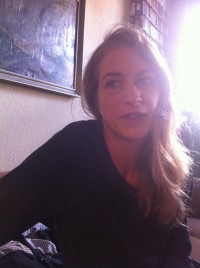The first novel to state in black and white that the author worked with Beemgee.
This is certainly not the first book for which our author tool was used. But it is the first time that an author explicitly mentions Beemgee in her acknowledgements. Thank you, Katharina, we’re glad you use Beemgee during your story development!
 All The Rage – Der letzte Schrei
All The Rage – Der letzte Schrei
published by the renowned Piper Verlag (Bonnier group)
Susanne Pfeiffer has recently joined the Beemgee team. She interviewed her long-time friend Katharina Gerwens for us.
Congratulations, Katharina! It’s always great when you can hold your own book in your hands … How many novels have you published so far?
This is my eleventh regional thriller published by Piper. Soon I’ll make it a dozen ….
I think ALL THE RAGE is a really good thriller title! You like double meanings. – But I want to get at something completely different: You know my foible to start every book by reading the acknowledgements – and here it says, last but not least, you worked on the plot with BEEMGEE! How so?
Because for me any support I get is worth mentioning! I have asked so many people in my field about all sorts of things, and in these conversations new aspects have always emerged – the least I can so is say thank you! ALL THE RAGE is, by the way, the first book in which I worked with Beemgee – and it was a great help to me. (more…)
Reflections on dialectically guided writing, or: Can dialectics help us tell better stories?
 Guest post by Richard Sorg.
Guest post by Richard Sorg.
Prof. Dr. phil. Richard Sorg, born in 1940, is an expert in dialectics. What is that, and what does it have to do with my novel? Well, “All great, moving and convincing stories are inconceivable without the central significance of the contradictions and conflicts that represent the driving energy of movement and development.” This puts us in the middle of dialectics. And of storytelling.
After studying theology, sociology, political science and philosophy in Tübingen, West Berlin, Zurich and Marburg, Richard Sorg taught sociology in Wiesbaden and Hamburg. His book “Dialectical Thinking” was recently published by PapyRossa Verlag. (Photo: Torsten Kollmer)
Ideas that contain a potential for conflict.
Sometimes there is a single but central chord at the beginning of a piece of music, even an entire opera, which is then gradually unfolded. Its inherent aspects, harmonies and dissonances emerge from the chosen, sometimes inconspicuous beginning, undergoing a dramatic, conflictual development, so that a whole, complex story emerges at the end of the path of this simple chord after its unfolding. This is the case, for example, with the so-called Tristan chord at the beginning of Richard Wagner’s opera “Tristan und Isolde”, a leitmotif chord that ends with an irritating dissonance.
The beginning of a story is sometimes an idea, an idea which you may not know how to develop. But some such ideas or beginnings carry a potential within them that is capable of unfolding and which holds unimagined development possibilities. ‘Candidates’ for viable beginnings – comparable to the dissonant Tristan chord mentioned above – are those that contain a potential for conflict or contradiction within. But it can also be a calm with which the matter is opened up, a calm that may then prove to be deceptive. We also find something similar in some dramas, for example with Bertolt Brecht.
And with that, we are already in the middle of dialectics. (more…)

Author and creative writing teacher Jesse Falzoi was born in Hamburg and raised in Lübeck, Germany. Back in the nineties, after stays in the USA and France, she moved to Berlin, where she still lives with her three children.
She has translated Donald Barthelme stories into German. Her own stories have appeared in American, Russian, Indian, German, Swiss, Irish, British and Canadian magazines and anthologies. She holds an MFA in Creative Writing from Sierra Nevada College.
Her new book on Creative Writing is released end of May 2017.
At the age of twenty-one I quit university and bought a one-way ticket to San Francisco, USA. I wanted to get far away from my first attempts to grow up. I wanted to get away from a frustrating relationship and boring courses and everything that was pushing me to take life more seriously. I didn’t have any plans what I would be doing in San Francisco but I had the address of an acquaintance I had made a year before. I went on a journey that was physical in the beginning and became more and more spiritual during the process. I bought a return ticket in the end and went back to my hometown just to pack my suitcases for good; I’d be staying in Germany, but I wouldn’t be staying home.
(more…)
Why You Have to Hurt the Characters You Love

Guest Post by Connor Rickett, 05/06/2015
Connor Rickett is a former professional scientist, current professional blogger and writer, travel enthusiast, lover of learning, and reluctant participant in social media. He is currently in the early stages of fortune and fame: debt and infamy.
Check out Cities of the Mind, his site for writers and freelancers looking to get better at what they do!
The Problem
All too often, the working writer finishes a draft of a story or book, only to find big stretches falling flat. There’s just something missing. It happens to published authors, too; I think of it as the “Second Book Curse”. This is where the writer has built a character, and things just work out a little too well for them. Sure, they’re challenged, put in mortal danger, thrashed a little bit, but, somehow, the tension from the first novel is gone. Most good writers seem to figure this out, and coming roaring back in the third book. Or maybe you just never read the ones who don’t.
But why does this happen? And, more importantly, how can you avoid it? (more…)
 All The Rage – Der letzte Schrei
All The Rage – Der letzte Schrei
 Guest post by Richard Sorg.
Guest post by Richard Sorg.
